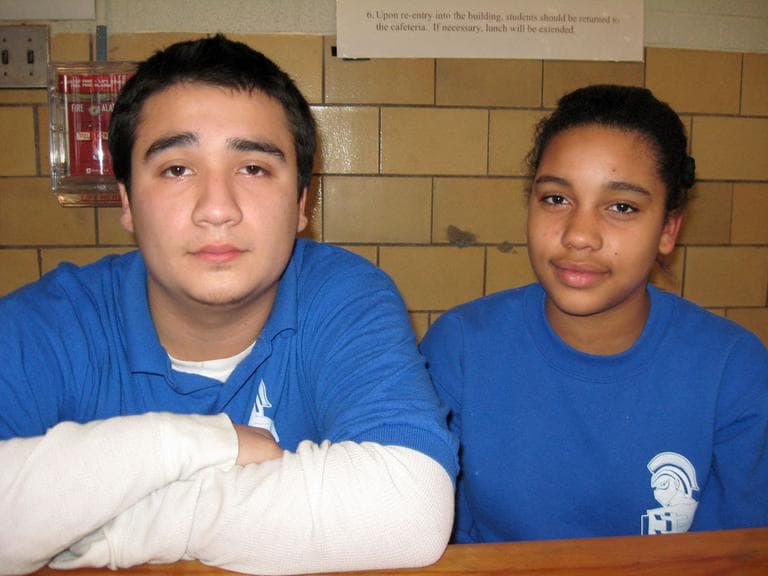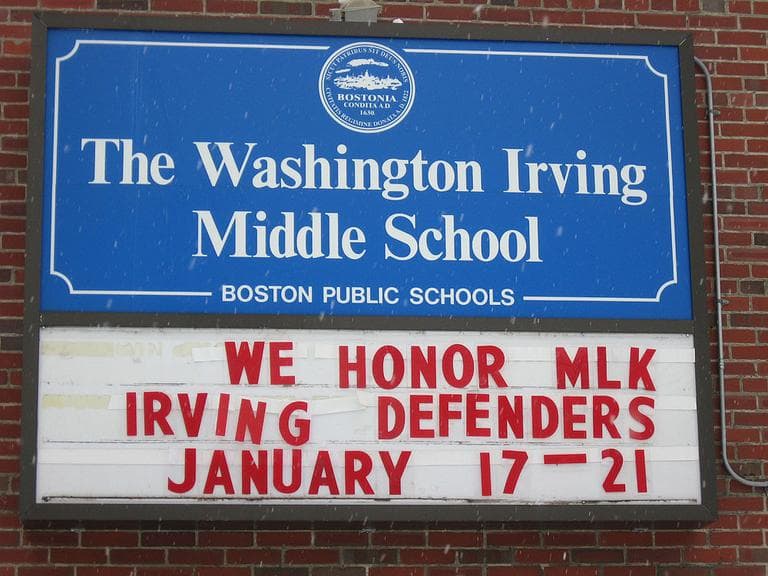Advertisement
To Fight Bullies, Boston School Doesn't Just Punish — It Rewards
Resume
In the past two years, at least two Massachusetts students have killed themselves after being harassed by their classmates. And ever since, bullying — or, more specifically, how to stop bullying — has become a priority at many schools in the state.
In fact, the state Department of Education now requires school systems to have anti-bullying plans. Those plans often focus on how to punish bullies and, in egregious cases, whether to bring criminal charges. But one Boston school that put its anti-bullying plan in place last September isn't just cracking down on bad kids; it's also rewarding students who stand up to bullies.
At Washington Irving Middle School in Roslindale, students who take a stand get a title that's announced to the whole school: they're called "defenders."
I met two of those defenders this week, in the school cafeteria. Eighth-grader Kevin Mendez earned his defender title when he helped out a sixth grader who was being hassled on his way home from school.

"He gets on my bus, and on the afternoon bus they were calling him names and everything — picking on him, hitting him," Mendez explains. "And he was new to the school, so he didn't have that many friends. So I decided to step in and walk him home. And they're like, 'Mind your own business.' I'm like, 'It is my business because you wouldn't want somebody else doing it to you, either.' They just needed somebody to tell them to stop."
Somebody to tell them to stop. Sounds simple. Kind of. You just have to have the guts to say "don't do that" to somebody who may be bigger or older or more popular than you. Even when you're an adult, that's not easy to do. So imagine what it's like when you're a middle schooler.
In middle school, students are "constantly trying to measure themselves in terms of, 'Where am I going to be on the social pecking order?' And it's not settled," says the school's principal, Arthur Unobskey. "So one way — one cheap way — is to be nasty."
To be a bully. Because being a bully can boost a kid's social status — unless, Unobskey says, other kids shame the bullies. Call them out. Make them feel unpopular. And that's what he wants his students to feel comfortable doing.
"We don't have control over a lot of things," Unobskey says, "but we do have control over how we treat people. And we want to celebrate that that's actually a huge amount of power to have, and that you can really affect your world by treating people in a certain way.
"Once you call out a bully, they realize that it’s wrong, that nobody finds it funny anymore, so they just stop.”
Monique Reyes, seventh grade 'defender'
"We very much want to take these kids — some of whom happen to be incredibly popular kids and some of whom who don't — and to say that this is a group of kids that have really stepped forward and this is what we model, this is what we admire, these are the kids that are really shining here and put them in the spotlight."
Bullying doesn't just happen on buses and playgrounds, of course. Monique Reyes is a seventh grader who earned her "defender" title for speaking up for a student that she says was being bullied in a classroom.
"There was this girl that used to pick on this boy because he likes to talk a little bit too much, like he asks too many questions," Reyes recalls. "And he asked a question and she thought that it was a dumb question. But I'm like, 'If it was his question, he didn't understand it, so it should be his right to ask it.' Because I saw that it actually made him feel bad.
"And when I saw it was starting to affect him, I stepped in. I know that everyone else agreed, but they just didn't want to say anything. Once you call out a bully, they realize that it's wrong, that nobody finds it funny anymore, so they just stop."
Monique and Kevin and three other students at Washington Irving have been named "defenders." They were recognized in an assembly in front of the whole school and each of them received a little purple wrist band that says "defender" on it.
You might think they'd consider that kind of silly, kind of uncool. But the kids say they like wearing the wristband. Kevin says it makes him feel "accomplished." That was his word, a 14-year-old's word: accomplished.
And that seems to suggest that the school's anti-bullying plan is working in surprising ways.
This program aired on January 27, 2011.
